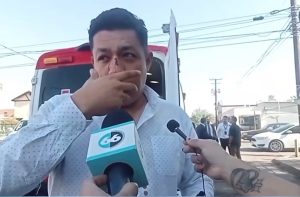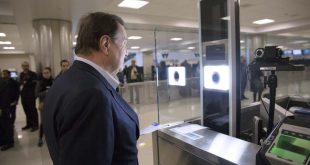 -Editorial
-Editorial
Journalist Jorge Heras, host of the show Ciudad Capital on CreaLaNoticia, was attacked Monday morning by two unidentified men as he arrived at the media outlet’s offices in Mexicali.
According to initial reports, the assailants were waiting near the intersection of Panamá Street and Lima Avenue. When Heras approached, they struck him in the face and abdomen while telling him to “tone it down.” Paramedics from the Mexican Red Cross treated him at the scene, determining hospitalization was not necessary.
The attackers fled immediately, and only limited descriptions were provided. Heras said one man was bald with a mustache, while the other wore dark clothing. The assault appeared to be an attempt to intimidate and silence the journalist, known for his critical style and investigations into political and social issues in Baja California.
Governor Marina del Pilar Ávila Olmeda issued a statement condemning the attack. “My total solidarity with journalist Jorge Heras. The aggression he suffered this morning is a cowardly act that threatens not only his integrity, but also freedom of expression and society’s right to be informed,” she said. She added that the Baja California Attorney General’s Office had opened an investigation and promised there would be no impunity.
Mexicali Mayor Norma Bustamante also denounced the incident, pledging municipal support for the investigation. “We strongly condemn the aggression against journalist Jorge Heras. We trust the authorities will conduct a thorough investigation to find those responsible. Impunity cannot be tolerated in our city,” she stated.
Baja California Congresswoman Eva María Vázquez issued one of the strongest statements following the attack, calling it a direct assault on press freedom. “This act is neither casual nor isolated; it reflects a government that harasses, intimidates, and seeks to silence those who dare to question it,” she declared. Vázquez accused the ruling party Morena of normalizing violence against the press through “hate speech, smear campaigns, and constant disqualifications.” “Enough is enough—free journalism in a democracy cannot be touched,” she added, demanding immediate justice, exemplary punishment for the attackers, and real guarantees for journalists to work without fear. “The silence this authoritarian regime wants to impose will not stand. We will not allow it.”
For some colleagues, however, political statements are not enough. Reporter Andrea Celeste criticized what she described as empty rhetoric. “Instead of condemning a system known to be corrupt, this is the moment to build a more transparent and effective protection mechanism for journalists. Condemnations mean nothing if, from positions of power, they continue to intimidate and denigrate both the press and society,” she said.
The Mexicali Business Coordinating Council also condemned the attack, warning that violence against communicators is a direct threat to freedom of expression, the right to information, and the democratic life of society. In a public statement, the group stressed that such incidents cannot be minimized or left unpunished, as they create fear and restrict responsible journalism. The council urged authorities to provide immediate protection, carry out a thorough investigation, and ensure accountability.
Journalism in Mexico Under Siege
Mexico remains one of the most dangerous countries in the world for journalists. Press freedom groups consistently rank the nation among the highest for unsolved crimes against the press. Since 2000, more than 100 media workers have been killed or disappeared, most cases marred by impunity and flawed investigations.
The Committee to Protect Journalists (CPJ), Reporters Without Borders (RSF), and other international organizations have repeatedly urged Mexico to strengthen protections for reporters, but critics say progress has been slow. Many journalists remain unprotected despite being enrolled in federal protection programs, and aggressors—whether linked to organized crime or politics—rarely face prosecution.
The situation has worsened in recent years, particularly under the presidency of Andrés Manuel López Obrador (AMLO). Watchdog groups report that violence against journalists and media workers rose by more than 80% during his administration. Critics argue that López Obrador’s daily morning press briefings, often used to discredit reporters and independent outlets, have fueled hostility against the press and emboldened aggressors.
A surge of killings in early 2022, with multiple journalists murdered within the first weeks of the year, drew international outrage and highlighted the dangers faced by reporters who persist in exposing corruption, organized crime, and abuse of power.
The attack on Jorge Heras fits into a troubling pattern of intimidation and violence against communicators in Mexico’s border states, where drug trafficking, political corruption, and social inequality converge. Baja California, with its strategic location and binational connections, has been the scene of both groundbreaking investigative reporting and rising threats against media workers.
Analysts say the violence is fueled by a combination of organized crime interests, political tensions, and weak institutions. “Every attack that goes unpunished sends a message that silencing journalists is possible and safe for perpetrators,” said one media rights advocate who requested anonymity for security reasons.
As authorities investigate the attack on Heras, local and national journalists’ associations are demanding more than words of solidarity. They are calling for structural changes: stronger protection programs, faster investigations, and penalties that deter future aggressions.
For Heras himself, the attack is not just a personal threat but a reminder of the risks inherent in his profession. Speaking briefly after the incident, he reiterated his commitment to continue working. “Journalism cannot stop because of fear,” he said. “Silence is not an option.”
His words echo a sentiment shared by many reporters across Mexico who, despite constant risks, remain committed to informing the public. Their resilience underscores the importance of journalism as a cornerstone of democracy, even in the face of intimidation and violence.
The attack on journalist Jorge Heras is a stark reminder of the dangers confronting the press in Mexico, where violence, corruption, and impunity continue to threaten freedom of expression. It also highlights the urgent need for concrete action from authorities at all levels. Without real protection, transparency, and accountability, condemnations will remain hollow, and journalists will continue to work in fear.
Until then, Mexico’s “super peso” and international trade deals may dominate headlines, but the country’s democratic health will remain fragile as long as its journalists are attacked, threatened, or silenced.


